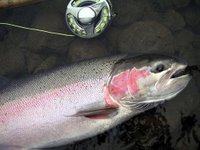ABOUT DreamsOfSteel
"For the past 30 years, hatchery production of Pacific salmon (chinook, coho, brown trout and steelhead trout) have provided the backbone of a Great Lakes angling renaissance that has sustained commercial and economic development in many coastal Great Lakes communities." Dreams of Steel chronicles the development and sustainability of this great resource, through the lens of a fly fishing journeyman.
HOME
Inside the Box
Photos
Lake Surface Temperature
Regional Snow Pack Data
USGS Water Data
Forums
Conservation Information
Fly Fishing Links












Previous Posts
- Inside the Box: DOS Tungsten Deep Steelhead Stone
- Weather Bumps Water
- Eagle Eye
- Green Eye'd Catt
- Inside the Box: Purple Heart
- Steelhead Bummin
- Two Handed Blow Out
- The Golden Hour
- Fruits of Early Season Labor
- Begenning of the End
Archives
- December 28, 2005
- December 29, 2005
- January 13, 2006
- April 26, 2006
- June 19, 2006
- July 13, 2006
- August 9, 2006
- September 10, 2006
- November 6, 2006
- November 7, 2006
- November 8, 2006
- November 13, 2006
- November 15, 2006
- November 17, 2006
- November 28, 2006
- November 29, 2006
- December 4, 2006
- December 5, 2006
- December 6, 2006
- December 7, 2006
- December 8, 2006
- December 10, 2006
- December 12, 2006
- December 15, 2006
- December 18, 2006
- December 25, 2006
- December 28, 2006
- January 3, 2007
- January 5, 2007
- January 12, 2007
- January 13, 2007
- January 15, 2007
- January 19, 2007
- January 29, 2007
- January 31, 2007
- February 4, 2007
- February 6, 2007
- February 9, 2007
- February 10, 2007
- February 12, 2007
- February 13, 2007
- February 15, 2007
- February 19, 2007
- February 20, 2007
- February 23, 2007
- February 24, 2007
- March 8, 2007
- March 11, 2007
- March 15, 2007
- March 17, 2007
- March 19, 2007
- March 20, 2007
- March 22, 2007
- March 24, 2007
- March 31, 2007
- April 2, 2007
- April 4, 2007
- April 12, 2007
- April 13, 2007
- April 15, 2007
- April 21, 2007
- April 22, 2007
- April 27, 2007
- May 8, 2007
- May 18, 2007
- May 23, 2007
- May 29, 2007
- June 6, 2007
- June 13, 2007
- June 16, 2007
- June 19, 2007
- June 27, 2007
- July 9, 2007
- July 22, 2007
- August 4, 2007
- August 8, 2007
- August 13, 2007
- August 27, 2007
- August 29, 2007
- September 2, 2007
- September 4, 2007
- September 5, 2007
- September 6, 2007
- September 11, 2007
- September 28, 2007
- October 3, 2007
- October 6, 2007
- October 8, 2007
- October 15, 2007
- October 16, 2007
- October 17, 2007
- October 30, 2007
- November 7, 2007
- November 12, 2007
Blog Roll
The Fly Fishing Loop is sponsored by flydepot.com
[ Home Waters | Next | Random | List | Search ]



